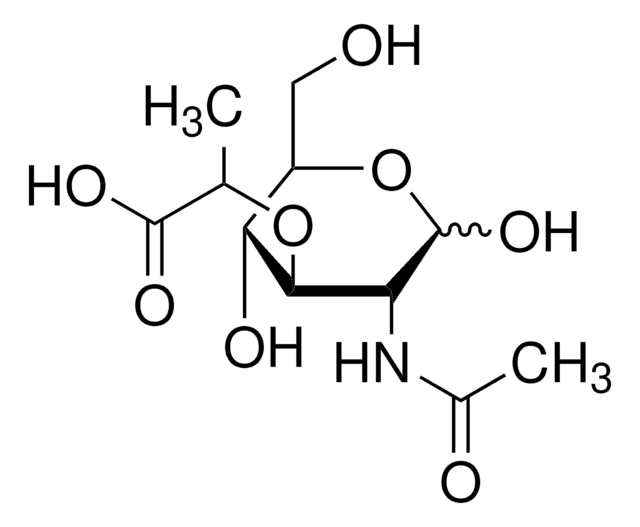69554
Peptidoglycan from Bacillus subtilis
Synonyme(s) :
PGN
Se connecterpour consulter vos tarifs contractuels et ceux de votre entreprise/organisme
About This Item
Vous recherchez des produits similaires ? Visite Guide de comparaison des produits
Catégories apparentées
Description générale
Peptidoglycan.is a biopolymer that is a major component of the cell walls of Gram-positive bacteria. Peptidoglycan consists of a carbohydrate backbone of alternating units of N-acetyl glucosamine and N-acetyl muramic acid and is modified with both D- and L-amino acids. N-Acetyl muramic acid residues are cross-linked with oligopeptides. The terminal peptide is D-alanine although other amino acids are present as D-isomers.
Application
Peptidoglycan may be used for the activity estimation of lytic enzymes (e.g. lyticase). It is recommended to use a peptidoglycan concentration of 0.15-3 μg/ml in water or buffer and measuring at 450 nm. The peptidoglycan is not soluble but produces a suspension in water.
Peptidoglycan activates the Toll-like receptor 2 (TLR2), present in mammalian cells for the stimulation of lymphocytes. It may also function as an antagonist of Poly (I:C).
Peptidoglycan activates the Toll-like receptor 2 (TLR2), present in mammalian cells for the stimulation of lymphocytes. It may also function as an antagonist of Poly (I:C).
Conditionnement
Bottomless glass bottle. Contents are inside inserted fused cone.
Code de la classe de stockage
11 - Combustible Solids
Classe de danger pour l'eau (WGK)
WGK 3
Point d'éclair (°F)
Not applicable
Point d'éclair (°C)
Not applicable
Équipement de protection individuelle
Eyeshields, Gloves, type N95 (US)
Certificats d'analyse (COA)
Recherchez un Certificats d'analyse (COA) en saisissant le numéro de lot du produit. Les numéros de lot figurent sur l'étiquette du produit après les mots "Lot" ou "Batch".
Déjà en possession de ce produit ?
Retrouvez la documentation relative aux produits que vous avez récemment achetés dans la Bibliothèque de documents.
Les clients ont également consulté
Angela Cuttitta et al.
Fish & shellfish immunology, 67, 86-94 (2017-06-06)
Gene family encoding allograft inflammatory factor-1 (AIF-1) is well conserved among organisms; however, there is limited knowledge in lower organisms. In this study, the first AIF-1 homologue from cnidarians was identified and characterised in the sea anemone Anemonia viridis. The
Yichao Xie et al.
Fish & shellfish immunology, 106, 384-392 (2020-08-11)
Antimicrobial peptide (AMP) is a crucial component of the innate immune system in crustaceans. In mud crab, Scylla paramamosain, a commercially important species, a glycine-rich antimicrobial peptide (Spgly-AMP) gene was newly identified and putatively encoded a 26aa signal peptide and
Christian Stelter et al.
PloS one, 6(6), e20749-e20749 (2011-06-23)
Intestinal inflammation induces alterations of the gut microbiota and promotes overgrowth of the enteric pathogen Salmonella enterica by largely unknown mechanisms. Here, we identified a host factor involved in this process. Specifically, the C-type lectin RegIIIβ is strongly upregulated during
Qian Zhu et al.
Fish & shellfish immunology, 100, 9-17 (2020-03-05)
Interleukin (IL)-11 is a multifunctional cytokine that exerts a series of important immunomodulatory effects and exists in many tissues and cells. A 1106-bp nucleotide sequence representing the complete cDNA of IL-11 was obtained from large yellow croaker (Larimichthys crocea), containing
Yu-Yuan Chen et al.
PloS one, 9(12), e115232-e115232 (2014-12-18)
Invertebrates rely on an innate immune system to combat invading pathogens. The system is initiated in the presence of cell wall components from microbes like lipopolysaccharide (LPS), β-1,3-glucan (βG) and peptidoglycan (PG), altogether known as pathogen-associated molecular patterns (PAMPs), via
Articles
Peptidoglycans
Notre équipe de scientifiques dispose d'une expérience dans tous les secteurs de la recherche, notamment en sciences de la vie, science des matériaux, synthèse chimique, chromatographie, analyse et dans de nombreux autres domaines..
Contacter notre Service technique




